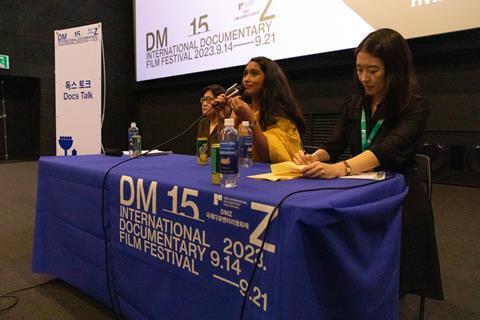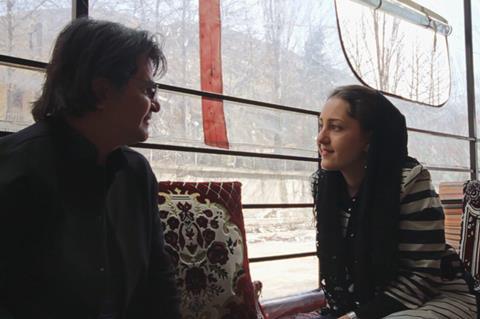
Indian filmmaker Sreemoyee Singh has reflected on how her documentary And, Towards Happy Alleys captured the seeds of recent protests in Iran and why cinema was the best tool to reveal issues facing women in the country.
“I was filming from 2015 to 2019, but I see now that the film shows the seeds of where the protests began,” said Singh at a screening of her film at DMZ International Documentary Film Festival in South Korea.
Inspired by Iranian cinema and poetry, first-time director Singh spent seven years in Tehran interviewing filmmakers, activists and women to create a portrait of a nation on the edge of revolution. Contributors include dissident director Jafar Panahi and Mohammad Shirvani.
The film, which premiered at the Berlinale, received its Asian premiere at DMZ Docs on September 16 – the one-year anniversary of ongoing civil unrest in Iran, sparked by the death of Mahsa Amini in police custody.
“It’s time to think about how we can contribute to this fight for freedom, to talk about what’s happening and make ourselves aware,” said the filmmaker. “Everyone is scared, yet they’re finding the courage to risk their lives every day. In that sense, it’s very hopeful.”
Singh added that while her film is not directly about these protests, its scenes are a testament to the “daily resilience” of women in Iran.
“I wanted to show how censorship works, how women manage, how artists and filmmakers manage when they are asked not to express themselves, yet still have the potential to fight,” said Singh. “For an Iranian, every day is a battle, living day by day is resilience, but they’re the most hopeful people; there’s a spirit of celebration. I wanted to show how life goes on, how despite living in a place like this people manage to laugh, make jokes, and celebrate togetherness. Cinema was the best tool through which I could do it.”
Created as part of a PhD thesis about Iranian new wave cinema, its true focus is on the daily struggles of Iranian women, whose discontent with the regime evolved into the recent protests.
Much of the film centres on the legacy of feminist poet Forugh Farrokhzad, who died in 1967 at just 32 but left behind influential writings, short films and “inspired a generation of women,” said Singh.
“She talks about femininity in a way that many of us can’t even talk about today,” added Singh. “Even today, women huddle around her grave and light candles. She’s still living in the hearts of Iranians, and she became a part of my film and my life.”

Singh’s love of Iranian cinema and poetry inspired her to learn Farsi. Part of that process involved learning popular Iranian songs, which she would sing to her interviewees — through whom she learned that women are not allowed to sing in public.
“This was a shock to me, but every time I sang everyone joined in, and a forbidden space of expression opened up,” said Singh. “It was not planned at all, but music became an important part of the film. In the film you see people like Panahi asking me to sing, because they haven’t heard women singing publicly.”
Through moments like these, Singh explained, the film veered from direct cinema to verite style, in which the director appears on camera and influences events.
“There’s a moment at the beginning where a woman on the bus asks if I’m filming her,” the director recalled. “This was a decisive moment for me, because I realised it couldn’t just be observational, I had to become a part of the film, and from there it became a conversation.”
Singh also spoke about the importance of DMZ Docs to her film. She pitched it at the festival’s market in 2017, where DMZ became “one of its first supporters”. She returned to the market in 2022 for industry pitches, before the film was selected to play in the Verite strand of this year’s festival.
“I have an incredible love for DMZ Docs and the kinds of films that you show,” added Singh.
























No comments yet